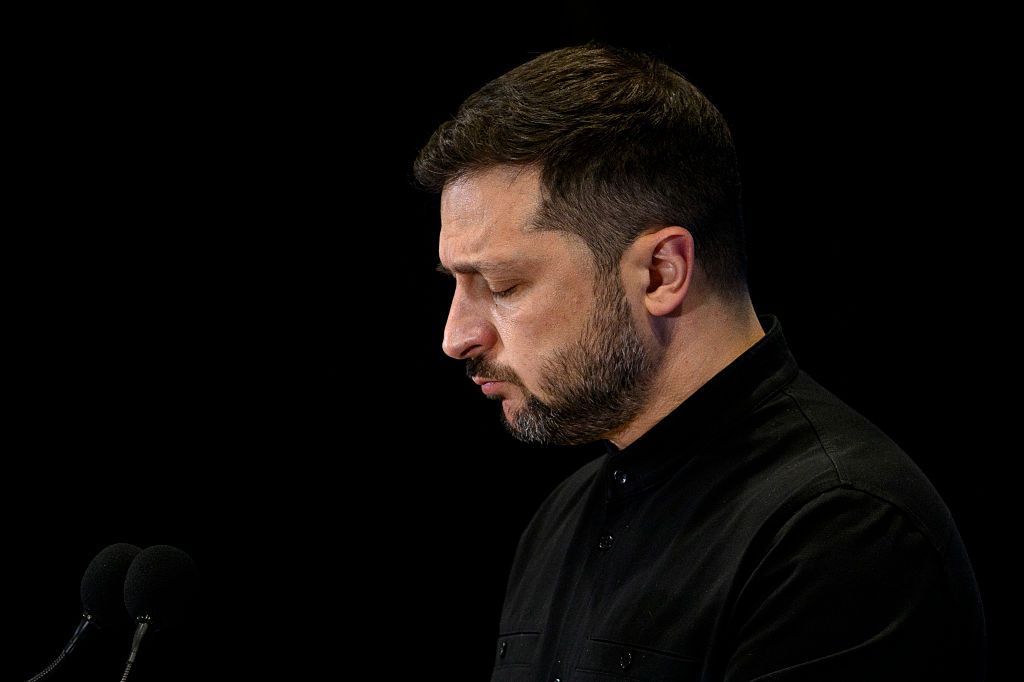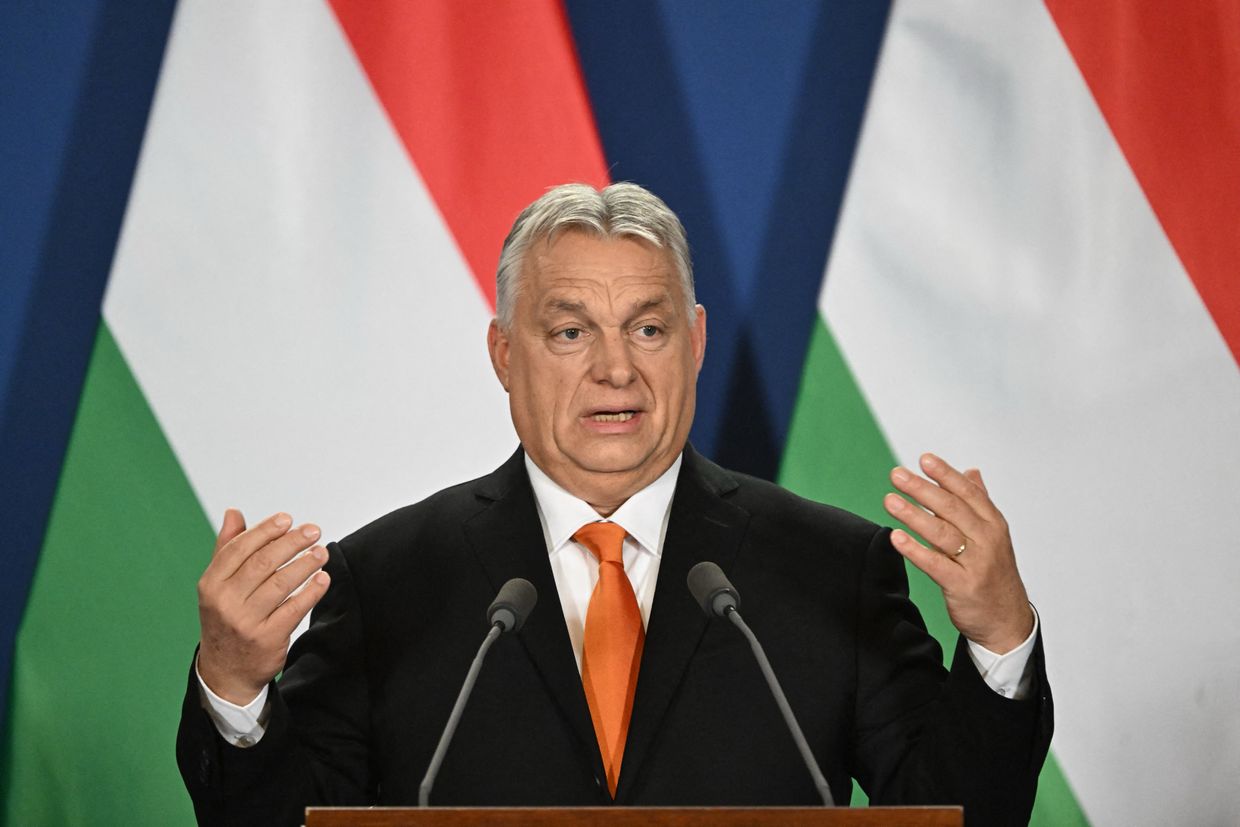Ukraine’s EU accession at risk ahead of critical anti-corruption vote

President Volodymyr Zelensky during a press conference in Kyiv, Ukraine, on Nov. 21, 2023. (Viktor Kovalchuk / Global Images Ukraine via Getty Images)
President Volodymyr Zelensky's sudden move to strip the country's anti-corruption infrastructure of its independence stunned the European Union.
Even as the Ukrainian authorities now attempt to reverse the controversial move that faced a harsh backlash from the EU and the wider public, the damage to Kyiv's potential accession to the union has already been done, experts say.
Two days after hastily signing a controversial bill that subordinates the National Anti-Corruption Bureau (NABU) and the Specialized Anti-Corruption Prosecutor's Office (SAPO) to the Prosecutor General, the president was forced to make a public U-turn, registering a bill that would walk back the introduced changes.
The given justification for such a chaotic back and forth — getting rid of Russian influence — was met with skepticism on the streets of Kyiv and in the high cabinets of Brussels.
European Commission President Ursula von der Leyen and other European leaders held calls with Zelensky to stress the importance of the anti-corruption infrastructure — a key condition for the start of accession talks.
"(Ukraine) must build on these solid foundations and preserve independent anti-corruption bodies, which are cornerstones of Ukraine's rule of law," von der Leyen said in a post on X on July 27, after her call with Zelensky.
“It’s not just about the law itself, but about the signal it sends: that key institutions can be brought under political control within one day.”
"What (European allies) have seen is how quickly a decade's worth of anti-corruption reforms can be undone in just a few hours," Elena Davlikanova, a Democracy Fellow with the Center for European Policy Analysis, told the Kyiv Independent.
"It's not just about the law itself, but about the signal it sends: that key institutions can be brought under political control within one day."
It took 12 hours for the parliament to pass and the president to sign the contentious bill that sparked first mass protests since the start of the all-out war.
Member of the European Parliament Daniel Freund, who recently visited Ukraine and specializes in transparency and the fight against corruption, admitted that the U-turn in the rule of law may put the accession process and the future of the EU funding at risk.
The European Commission said a few days after Zelensky signed the controversial bill into law that the next tranche of EU financial assistance to Ukraine under the Ukraine Facility mechanism would be cut due to unfulfilled reforms.

While the European officials, behind closed doors, confirm that this specific funding cut was not connected to the recent legislation, many say that future support is now in question.
"We were not given a heads-up," Freund told the Kyiv Independent, saying that the EU was "taken aback by this development."
A top EU official, speaking on conditions of anonymity, said that the bloc is in touch with Ukraine and has made its position clear on the recent developments, especially as an ally providing the war-torn country with significant financial assistance on the condition of progress in transparency, judicial reform, and democratic governance.
"What matters for now is that Ukraine can guarantee that its anti-corruption bodies are fully independent," the EU official told the Kyiv Independent.
Worst timing
The timing of the newly adopted law that critics say was to dismantle the independence of two key anti-corruption bodies was especially hurtful, according to the politicians and experts, who spoke with the Kyiv Independent.
The EU was close to formally launching the accession process and opening the first negotiation cluster despite Hungary's veto, according to the Kyiv Independent source, a high-ranking European diplomat, who spoke on condition of anonymity.
EU politicians, such as Hungarian Prime Minister Viktor Orban, could use Ukraine's anti-corruption backsliding to their advantage, according to Freund. While he believes that the "accession process should proceed swiftly" as long as Ukraine reverses the bill, the U-turn doesn't help build the EU's trust in Ukraine, especially as the member states were putting pressure on Orban to lift his veto.
"I fear he (Orban) might misuse Tuesday's changes for his pro-Russian (and) anti-Ukrainian agenda," Freund told the Kyiv Independent.
"The longer the process of abolishing the subordination of NABU and SAPO to the prosecutor general is delayed, the more problems there will be for European integration and for public trust in the authorities."
Mattia Nelles, co-founder and executive director of the Germany-based think-tank German-Ukrainian Bureau, also believes that such "big stepbacks" even if reversed would only encourage those who oppose Ukraine joining the EU one day.
"Trust has been damaged," Nelles told the Kyiv Independent, stressing that the Ukrainian side's decision to ignore European partners' warnings with its "reckless government policy" was hurtful.
Much depends on the Ukrainian government's next steps, according to the experts.
Liubov Akulenko, the executive director of the Kyiv-based Ukrainian Center for European Policy, said that it is crucial for parliament to move quickly in reversing the July 22 law "without any crazy amendments."

Akulenko also stressed that it would be important for the EU to "show its teeth" from now on as strict control and monitoring of Ukraine's fight against corruption would be crucial, especially behind closed doors.
While the EU's enlargement policy faces challenges, Akulenko said the Ukrainian authorities' backward decision on July 22 likely "ruined" the trust, even after Ukraine had fulfilled the criteria for the first cluster to start.
"I do not even want to think when it will be possible to open the first cluster now," Akulenko told the Kyiv Independent.
The high-ranking European diplomat said, however, that it was the EU that was at fault for accession clusters to remain closed. "Ukraine did everything," the diplomat said. "We didn't."
Yaroslav Yurchyshyn, who was among the roughly 50 lawmakers who submitted another bill to restore NABU and SAPO's independence shortly before Zelensky submitted a bill of his own, said he believes that many in the parliament would vote in favor of reestablishing the independence of anti-corruption institutions if the President's Office tells them so.
"The longer the process of abolishing the subordination of NABU and SAPO to the prosecutor general is delayed, the more problems there will be for European integration and for public trust in the authorities," Yurchyshyn, head of the parliamentary committee on freedom of speech, told the Kyiv Independent.
"(Independent) NABU is of crucial importance to us," the high-ranking European diplomat said.














